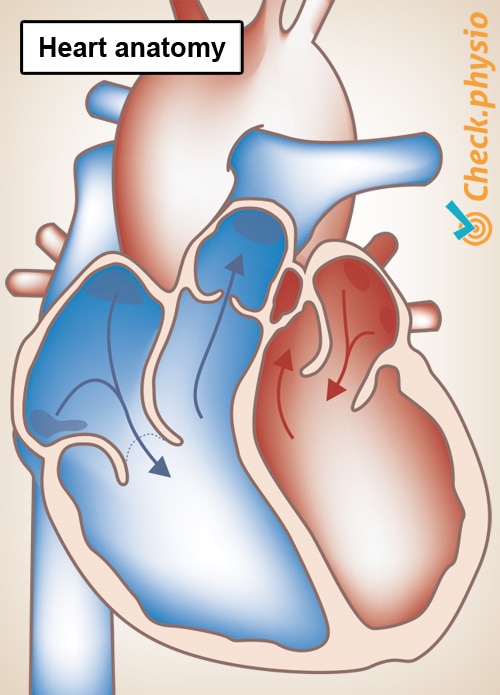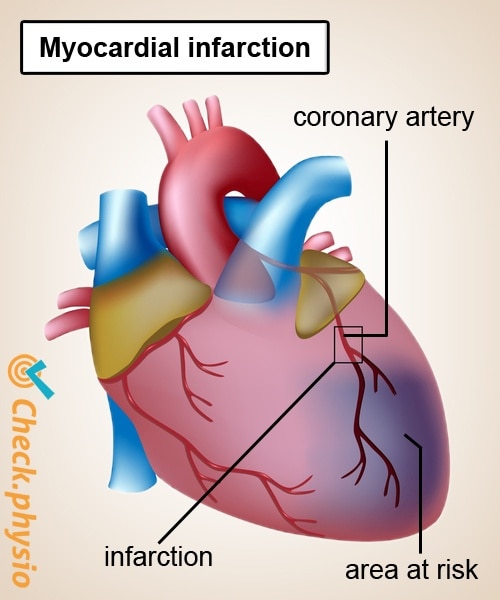Heart disease
Cardiac problems/ angina pectoris / acute coronary syndrome / acute myocardial infarction/ heart failure
The heart is a hollow muscle about the size of a clenched fist. This muscle contracts at least 100,000 times per day and pumps blood throughout the body. Various problems in and around the heart can result in severe symptoms.

In this article we will discuss a number of problems that can cause cardiac symptoms. Please seek advice from your doctor immediately if you recognize these symptoms.
Description of condition
An infarction or heart attack prevents the flow of blood to the heart via the coronary arteries. Part of the heart muscle will be starved of oxygen and it will no longer contract. If this area goes without oxygen for too long, it will gradually start to die. Scar tissue made up of dead cells will form at the site where the muscle cells died.
Disruption to the pump functioning of the heart is referred to as heart failure. A distinction is made between systolic heart failure and diastolic heart failure. In systolic heart failure, the heart muscle does not contract forcefully enough and the blood is pumped less effectively. In diastolic heart failure, the heart muscle does not relax properly between contractions. As a result, the hollow muscle does not fill entirely with blood.
Other problems include: arrhythmia (the heart beats too quickly, too slowly or irregularly); conditions affecting the heart valves (the heart valves do not close properly or are constricted, causing the heart to have to work harder); heart muscle disease (a thickening or dilation of the heart muscle, resulting in decreased pumping strength); high blood pressure (with high blood pressure, the heart has to pump against high pressure. The heart produces more muscle to achieve this and becomes thicker as a result).
Cause and history
Depending on the type of heart problem, symptoms may develop gradually or acutely. Sometimes the symptoms are only present during physical exertion. In other cases they are also present at rest. Various risk factors determine the chances of developing cardiovascular disease:
- Smoking.
- High cholesterol.
- High blood pressure.
- Being overweight.
- Diabetes.
- Stress.
- Unhealthy diet.
- Not enough exercise.
- Genetics: cardiovascular disease in father, mother, brother or sister before the age of 65.
- Increasing age.
- Gender (male).
Signs & symptoms
Each type of heart problem has its own symptoms and can present differently in each unique case. An overview is provided below of the major signs and symptoms that may be related to the heart.
- Pressure or a tight feeling across the chest (angina pectoris).
- The pain may radiate to the (left) arm, shoulder, neck or jaw.
- Shortness of breath, feeling of tightness.
- Reduced stamina (tired more easily by activities).
- Palpitations (an unpleasant awareness of your heartbeat).
- Fainting.
- Feeling unwell, nausea.
- Clammy, pale or gray skin tone.
- Swelling of limbs.
- The pain is not linked to movements of the trunk (bending, stretching, twisting).
Diagnosis
Treatment
Exercises
You can check your symptoms using the online physiotherapy check or make an appointment with a physiotherapy practice in your locality.

References
Hoes, A.W., Voors, A.A., Rutten, F.H., Lieshout, J. van, Janssen, P.G.H. & Walma, E.P. (2010). NHG-standaard. Hartfalen. Tweede herziening. Huisarts Wet. 2010; 53(7):368-89.
Rutten, F.H., Bohnen, A.M., Schreuder, B.P., Pupping, M.D.A. & Bouma, M. (2004). NHG-standaard. Stabiele angina pectoris. Tweede herziening. Huisarts Wet. 2004; 47(2):83-95.
Rutten, F.H., Grundmeijer, H.GL.M., Grijseels, E.W.M., Bentum, S.T.B. van, Hendrick, J.M.A., Bouma, M., Eizenga, W. & Pinxteren, B. van (2003). NHG-standaard. Acuut coronair syndroom. Huisarts Wet. 2003; 46(14):831-43.



